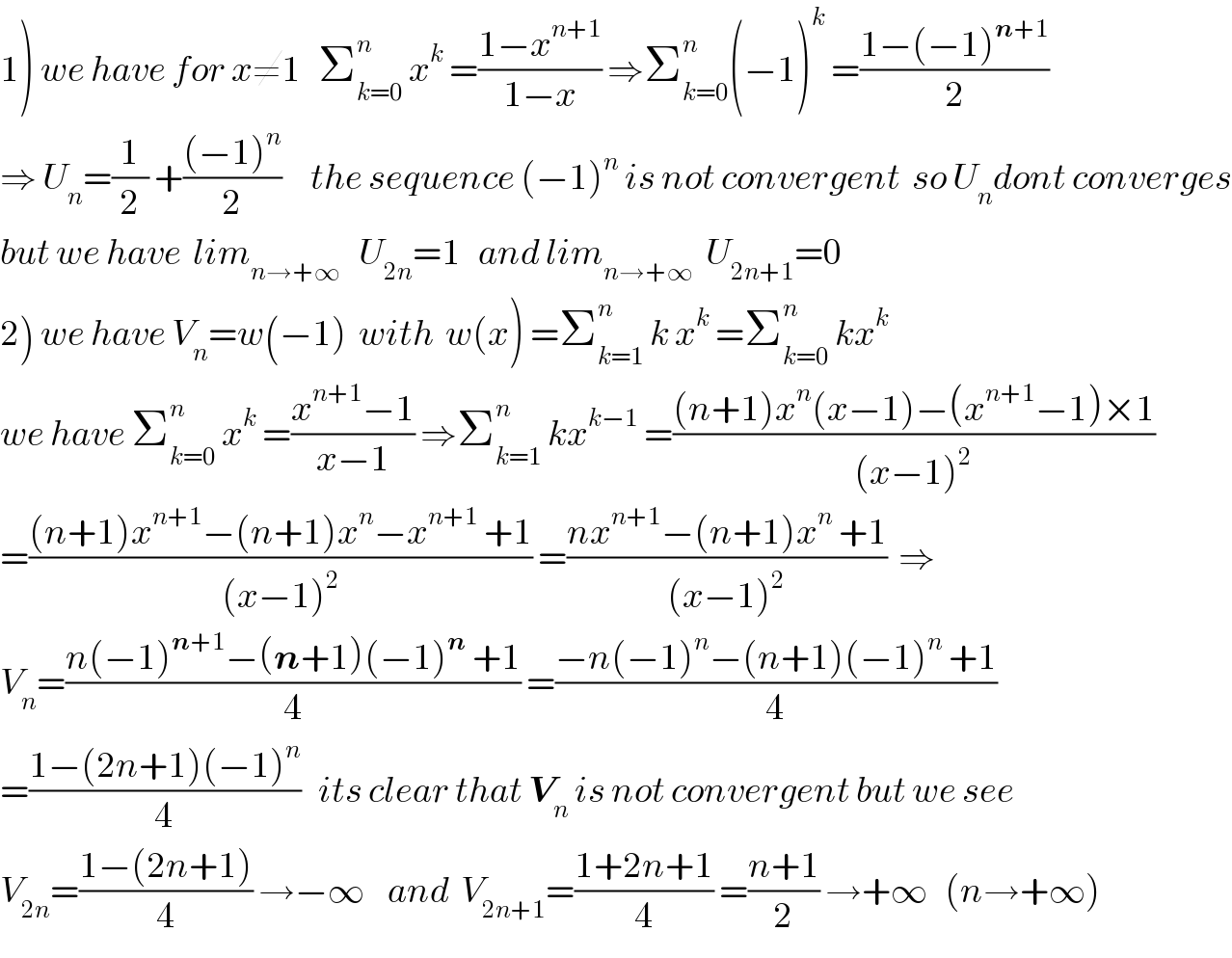Question Number 61536 by maxmathsup by imad last updated on 04/Jun/19
![1)let U_n =Σ_(k=0) ^n (−1)^k =1−1+1−1+...(n+1 terms) is lim_(n→+∞) U_n exist ? find U_n by using integr part[..] 2) let V_n = Σ_(k=1) ^n k(−1)^k = −1+2 −3+4+.....(nterms) is lim_(n→+∞) V_n exist find V_n by using integr part[..]](https://www.tinkutara.com/question/Q61536.png)
$$\left.\mathrm{1}\right){let}\:{U}_{{n}} =\sum_{{k}=\mathrm{0}} ^{{n}} \left(−\mathrm{1}\right)^{{k}} \:=\mathrm{1}−\mathrm{1}+\mathrm{1}−\mathrm{1}+…\left({n}+\mathrm{1}\:{terms}\right) \\ $$$${is}\:{lim}_{{n}\rightarrow+\infty} {U}_{{n}} {exist}\:?\:\:{find}\:{U}_{{n}} \:{by}\:{using}\:{integr}\:{part}\left[..\right] \\ $$$$\left.\mathrm{2}\right)\:{let}\:{V}_{{n}} =\:\sum_{{k}=\mathrm{1}} ^{{n}} {k}\left(−\mathrm{1}\right)^{{k}} \:\:=\:−\mathrm{1}+\mathrm{2}\:−\mathrm{3}+\mathrm{4}+…..\left({nterms}\right) \\ $$$${is}\:{lim}_{{n}\rightarrow+\infty} {V}_{{n}} \:{exist}\: \\ $$$${find}\:{V}_{{n}} {by}\:{using}\:{integr}\:{part}\left[..\right] \\ $$
Commented by maxmathsup by imad last updated on 04/Jun/19

$$\left.\mathrm{1}\right)\:{we}\:{have}\:{for}\:{x}\neq\mathrm{1}\:\:\:\sum_{{k}=\mathrm{0}} ^{{n}} \:{x}^{{k}} \:=\frac{\mathrm{1}−{x}^{{n}+\mathrm{1}} }{\mathrm{1}−{x}}\:\Rightarrow\sum_{{k}=\mathrm{0}} ^{{n}} \left(−\mathrm{1}\right)^{{k}} \:=\frac{\mathrm{1}−\left(−\mathrm{1}\right)^{\boldsymbol{{n}}+\mathrm{1}} }{\mathrm{2}} \\ $$$$\Rightarrow\:{U}_{{n}} =\frac{\mathrm{1}}{\mathrm{2}}\:+\frac{\left(−\mathrm{1}\right)^{{n}} }{\mathrm{2}}\:\:\:\:\:{the}\:{sequence}\:\left(−\mathrm{1}\right)^{{n}} \:{is}\:{not}\:{convergent}\:\:{so}\:{U}_{{n}} {dont}\:{converges} \\ $$$${but}\:{we}\:{have}\:\:{lim}_{{n}\rightarrow+\infty} \:\:\:{U}_{\mathrm{2}{n}} =\mathrm{1}\:\:\:{and}\:{lim}_{{n}\rightarrow+\infty} \:\:{U}_{\mathrm{2}{n}+\mathrm{1}} =\mathrm{0} \\ $$$$\left.\mathrm{2}\right)\:{we}\:{have}\:{V}_{{n}} ={w}\left(−\mathrm{1}\right)\:\:{with}\:\:{w}\left({x}\right)\:=\sum_{{k}=\mathrm{1}} ^{{n}} \:{k}\:{x}^{{k}} \:=\sum_{{k}=\mathrm{0}} ^{{n}} \:{kx}^{{k}} \\ $$$${we}\:{have}\:\sum_{{k}=\mathrm{0}} ^{{n}} \:{x}^{{k}} \:=\frac{{x}^{{n}+\mathrm{1}} −\mathrm{1}}{{x}−\mathrm{1}}\:\Rightarrow\sum_{{k}=\mathrm{1}} ^{{n}} \:{kx}^{{k}−\mathrm{1}} \:=\frac{\left({n}+\mathrm{1}\right){x}^{{n}} \left({x}−\mathrm{1}\right)−\left({x}^{{n}+\mathrm{1}} −\mathrm{1}\right)×\mathrm{1}}{\left({x}−\mathrm{1}\right)^{\mathrm{2}} } \\ $$$$=\frac{\left({n}+\mathrm{1}\right){x}^{{n}+\mathrm{1}} −\left({n}+\mathrm{1}\right){x}^{{n}} −{x}^{{n}+\mathrm{1}} \:+\mathrm{1}}{\left({x}−\mathrm{1}\right)^{\mathrm{2}} }\:=\frac{{nx}^{{n}+\mathrm{1}} −\left({n}+\mathrm{1}\right){x}^{{n}} \:+\mathrm{1}}{\left({x}−\mathrm{1}\right)^{\mathrm{2}} }\:\:\Rightarrow \\ $$$${V}_{{n}} =\frac{{n}\left(−\mathrm{1}\right)^{\boldsymbol{{n}}+\mathrm{1}} −\left(\boldsymbol{{n}}+\mathrm{1}\right)\left(−\mathrm{1}\right)^{\boldsymbol{{n}}} \:+\mathrm{1}}{\mathrm{4}}\:=\frac{−{n}\left(−\mathrm{1}\right)^{{n}} −\left({n}+\mathrm{1}\right)\left(−\mathrm{1}\right)^{{n}} \:+\mathrm{1}}{\mathrm{4}} \\ $$$$=\frac{\mathrm{1}−\left(\mathrm{2}{n}+\mathrm{1}\right)\left(−\mathrm{1}\right)^{{n}} }{\mathrm{4}}\:\:\:{its}\:{clear}\:{that}\:\boldsymbol{{V}}_{{n}} \:{is}\:{not}\:{convergent}\:{but}\:{we}\:{see} \\ $$$${V}_{\mathrm{2}{n}} =\frac{\mathrm{1}−\left(\mathrm{2}{n}+\mathrm{1}\right)}{\mathrm{4}}\:\rightarrow−\infty\:\:\:\:{and}\:\:{V}_{\mathrm{2}{n}+\mathrm{1}} =\frac{\mathrm{1}+\mathrm{2}{n}+\mathrm{1}}{\mathrm{4}}\:=\frac{{n}+\mathrm{1}}{\mathrm{2}}\:\rightarrow+\infty\:\:\:\left({n}\rightarrow+\infty\right) \\ $$
